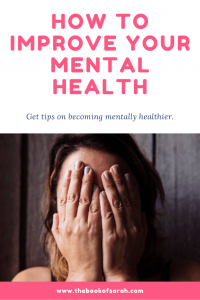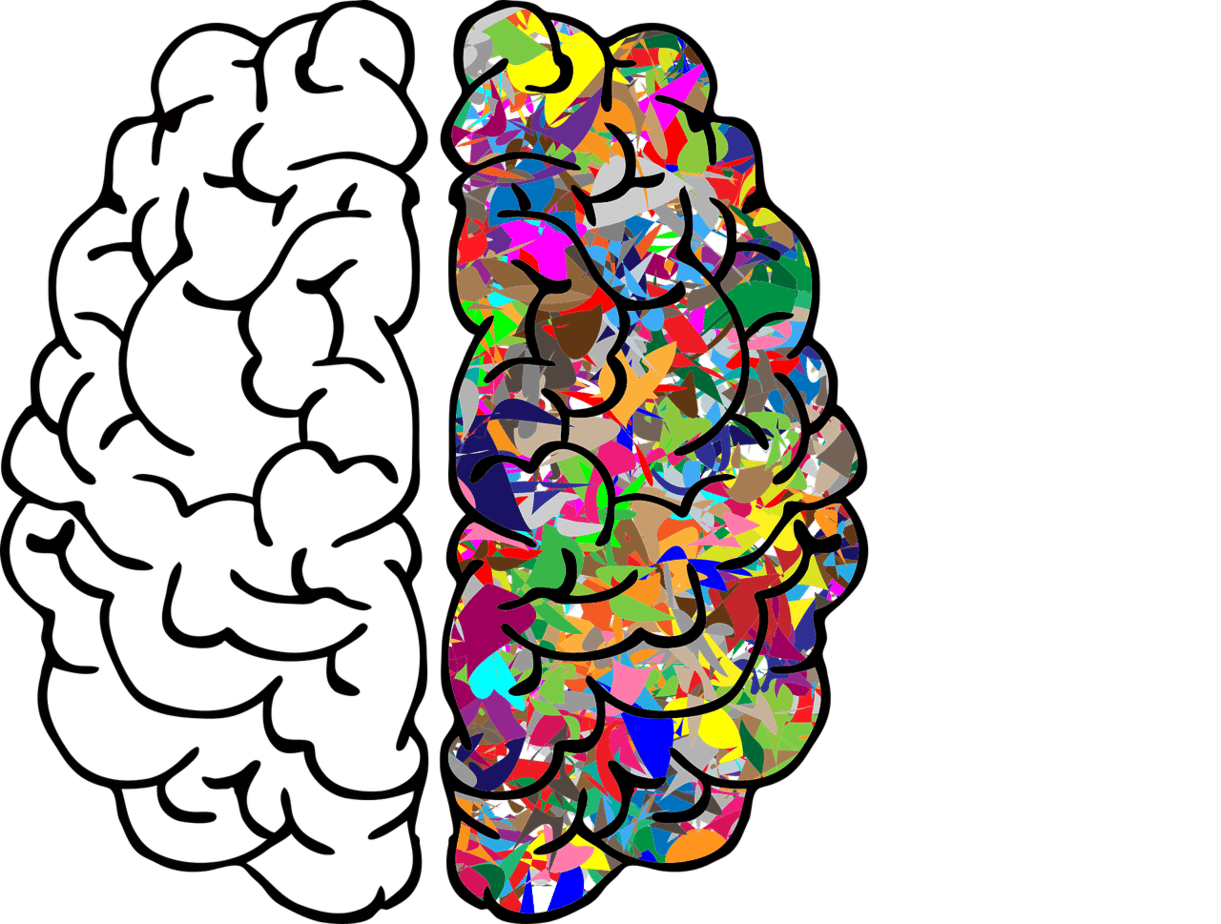How to improve your mental health
Today, we have more mental health concerns than we did a decade or two ago. Mental health awareness is an increasing concern as more people are struggling with mental health issues such as depression and anxiety. In fact, anxiety is one of the most common mental disorder.
All kinds of professionals, from medical specialists to scholars are seeking the different ways we can improve our mental strength and deal with mental health problems. They are looking into the different ways we can improve our mental strength.
I am not an expert, but my interest in psychology and personal development has led me to study the different ways to improve mental strength, deal with anxiety, avoid and fight depression and live happier and fulfilling lives. Here are some ways you can improve your mental strength.
Practice self-awareness
 Self-awareness is the key to taking charge of your life and mental health. Self-awareness involves becoming aware of who you are and why you behave the way you do.
Self-awareness is the key to taking charge of your life and mental health. Self-awareness involves becoming aware of who you are and why you behave the way you do.
To be self-aware, you need to understand your origin, your personality, and identity and how these influence the person that you are today. Your childhood and upbringing do influence how you behave and the decisions you make today.
If for example, you experienced some form of trauma in your childhood, it can influence your mental health today. It can lead to anxieties when you are in certain situations or depressive tendencies.
Self-awareness helps you explore such things as your childhood and upbringing and how they influence your behavior today.
Understanding your personality as well can be a door to understanding how your mind works. For example, for the longest time, I didn’t know how much my introversion influenced my decisions.
I questioned why I didn’t fit in certain situations until I understood my personality and accepted my behavior. It’s only through self-acceptance that you can start improving your mental health.
I often say if I had one gift I could give to everyone, it is the gift of self-awareness. I created a self-awareness guide to help individuals explore their self-awareness and practice it to get a clear understand of who they really are.
Work on your emotional intelligence
 Emotional intelligence is the next step to becoming self-aware. In fact, self-awareness is the core of emotional intelligence. Once you fully understand yourself and your emotions, you stand at a point whereby you can fully take charge of your emotions.
Emotional intelligence is the next step to becoming self-aware. In fact, self-awareness is the core of emotional intelligence. Once you fully understand yourself and your emotions, you stand at a point whereby you can fully take charge of your emotions.
“Self-awareness is knowing one’s emotions. It is recognizing a feeling as it happens”- Daniel Goleman.
Emotional intelligence involves recognizing your emotions as they happen and taking charge of them. As aforementioned, one of the most common mental health issues has to do with anxiety.
Having emotional intelligence, in this case, is recognizing when you are becoming anxious, the root of the anxiety and taking charge of the situation.
If something is giving you anxiety, when you are emotionally aware, you can choose to leave the situation, get a distraction or face your anxiety hands on.
Gaining emotional intelligence will help you manage a lot of other emotions such as anger and sadness which can be very harmful to your mental health.
Step out of your comfort zone
 Getting too comfortable in our comfort zones can make us develop anxiety when we get out of these zones. If you stay in your comfort zone, you’ll never grow.
Getting too comfortable in our comfort zones can make us develop anxiety when we get out of these zones. If you stay in your comfort zone, you’ll never grow.
It’s important that you take on some activities that make you uncomfortable, since its these situations that help you improve. If for example, social events give you anxiety, you can challenge yourself to attend a social event about once a month.
Facing some of what you fear will make you realize that they are not probably as bad as you thought they would be. Some of the things seem really big and scary in our minds but when we get to the situation we realize it is not that bad.
Your mind will learn to adapt every time you teach it to confront and embrace something new and you develop mental strength.
Develop resilience
“Resilience is a person’s ability to grow in the face of terrible problems’- Boris Cyrulnik
 I have written about resilience in the past and discussed it in a podcast since I believe that developing resilience is one of the most applicable ways to develop mental strength.
I have written about resilience in the past and discussed it in a podcast since I believe that developing resilience is one of the most applicable ways to develop mental strength.
By becoming more resilient, we can avoid depression and prepare our minds for difficult events that can happen to us. We cannot control what happens to us but we can control our reaction to it.
Resilience is developed by making our minds so adaptable and ready for change, such that when change or misfortunes happen, they don’t lead us into depression.
This can be achieved by accepting that misfortunes can happen, separating events that happen to us from actual life and trying not to personalize the events. I have discussed this under 3 thoughts that can completely transform our lives; a step towards emotional maturity.
Mental health challenges such as depression happen when we allow the events happening around us affect you as a person. Developing resilience, therefore, can tune our minds to be stronger such that when bad things happen, we are at a point of mental strength and our mental health is not affected.
‘To turn natural sadness into depression, all you have to do is blame yourself for the disaster that has befallen you’ Dorothy Rowe.
Exercise
 Just like exercise is good for your physical health, it is good for your mental health. Exercise helps us get out of our head and focus on our physical aspect. This means that we don’t overthink situations and therefore our mental health improves.
Just like exercise is good for your physical health, it is good for your mental health. Exercise helps us get out of our head and focus on our physical aspect. This means that we don’t overthink situations and therefore our mental health improves.
When you are focusing on physical activity such as swimming, cycling, running or jogging, hiking, your mind is largely on the activity and not much on the issues going on in your mind. This means that you avoid plunging deep into your problems and it is a very healthy form of distraction.
Working out also releases some chemicals called endorphins which trigger a positive feeling in our bodies. You see, most mental health challenges such as anxiety and depression take place when we are not feeling so great about ourselves and the situations we are going through.
However, when you get some exercise, you feel great, become more productive and therefore, improve the outlook on yourself as a person and of the situations, you are going through as well.
Practice thought-stopping
 Thought-stopping is used in therapy as a technique to interrupt, remove and replace negative and destructive thoughts. I recommended thought stopping in my previous article on why you are anxious and what to do about it.
Thought-stopping is used in therapy as a technique to interrupt, remove and replace negative and destructive thoughts. I recommended thought stopping in my previous article on why you are anxious and what to do about it.
Thought-stopping is whereby you issue the command STOP when you are experiencing some repeated and negative thoughts. For example, if you start thinking ‘I am a failure, I am worthless, I will never amount to anything’, you consciously say STOP!! You stop yourself from going that drain and replace these thoughts with positive thoughts.
Mental health challenges such as depression and anxiety are formed when you create certain thought patterns usually from irrational thoughts. Thought stopping, therefore, can help you prevent or manage anxiety and depression and generally improve your mental health.
Develop a positive attitude
“Possessing a great attitude is like having a secret weapon”- John Maxwell, Today Matters.
 A positive attitude can help you get through so many unfavorable situations. When you possess a positive attitude, your reaction to things that happen to you is that of optimism, knowing that things will get better.
A positive attitude can help you get through so many unfavorable situations. When you possess a positive attitude, your reaction to things that happen to you is that of optimism, knowing that things will get better.
You don’t take the events that happen to your life as an attack to you as a person, but as independent events that can happen to anyone and that you will pull out of these events.
You can develop a positive attitude by knowing and acknowledging that you re the captain of your ship and you determine how your life turns out and how you react to what happens to you.
A positive attitude can also be developed by thinking positive thoughts and surrounding yourself with positive people. I recommend the book Learned Optimism by Martin Seligman.
Get some self-care and find a balance
 Another way of developing a healthy mind is by getting some self-care. Your mental health could be suffering if you are buried to the neck by activities and events.
Another way of developing a healthy mind is by getting some self-care. Your mental health could be suffering if you are buried to the neck by activities and events.
If you have work, school, family and a lot of things to take care of you may feel as if you are drowning. As a result, you are likely to develop anxiety and/or depression especially when you feel that things are getting out of your control.
It’s important to find a balance such that you are meeting your obligations and you are caring for yourself at the same time. You can get some self-care and indulge in activities that make you feel good, activities that are safe and healthy as well.






Comments
This is just an amazing piece. Keep up the spirit. Cheers
Thank you Wambugu for reading. I hope this was helpful. Cheers